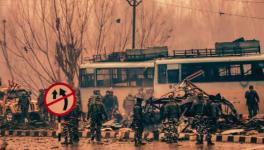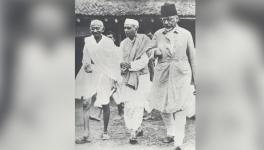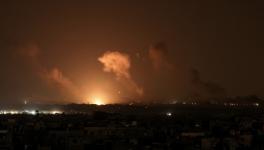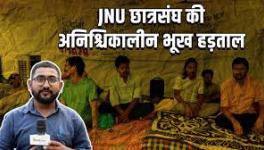Reflections on Events in Afghanistan-17
Trade caravan on the Silk Road, Central Asia
17. Foreign Devils on the Silk Road
The title of an unputdownable 1980 classic by Peter Hopkirk comes to mind even as the Shanghai Cooperation Organisation and the Collective Security Treaty Organisation are preparing to hold back-to-back summit meetings at Dushanbe, Tajikistan, on September 17.
Foreign Devils on the Silk Road: The Search for the Lost Treasures of Central Asia tells the breathtaking story of the intrepid men who made long-range archaeological raids in far west China looking for the lost cities of the Taklamakan Desert before they were gradually swallowed by the shifting waves of sand (and weren’t rediscovered until the early 19th century.)
Central Asia has been beyond the tour itineraries of External Affairs Minister S. Jaishankar. But this time around, he is making a great exception to attend the forthcoming SCO event in Dushanbe in person and possibly catch up on the CSTO summit from the sidelines.
This is an exceptional circumstance as the Taliban’s seizure of power in Afghanistan following the defeat of the US in the 20-year war is expected to be the main topic of discussion. The SCO and CSTO summits are expected to inject some transparency into the prospects, if any, for an anti-Taliban resistance at the regional level backed by a ‘coalition of the willing’ from among the member states of the two security organisations.
The West is not directly represented in the summit meetings but then, India’s presence makes up for it. Delhi also happens to be the flag carrier of the Quad, which is also holding its maiden summit in Washington on September 24 presided over by President Joe Biden in the ‘post-Afghanistan’ setting.
The regional reaction to the events in Afghanistan is not on an even keel. At one end stand Pakistan, Iran and China, which advocate an engagement with the Taliban so as to ‘guide and urge’ its policies in a positive direction in regard of an inclusive government and commitment to rooting out terrorist groups based in Afghanistan. They seem reasonably certain about Taliban’s receptiveness.
On the other extreme stands Tajikistan which refuses to accept a radical Islamist government next-door under any circumstance. In between stand two weathercocks — Russia and Uzbekistan.
So far, no regional state has advocated resistance to the Taliban government, although Russian propaganda apparatus has become patently unfriendly in a U-turn on orders of the Kremlin from Moscow’s effusive praise of the movement as a legitimate indispensable Afghan entity to President Putin’s own arrogant description of the Taliban as not being ‘civilised’ enough for company.
Iran has serious issues with the non-representation of non-Pashtun ethnic groups in the Afghan government. Indeed, Iran has ethnic affinities with the (Sunni) Tajiks and the Hazara Shias of Afghanistan who together account for some 45% of the population. Iran is unlikely to compromise on this issue. In a curious way, Iran is promoting the democratisation of Afghanistan. Which is a good thing.
But Iran has also taken on board the Taliban’s assurances that it will not allow Saudi-Israeli-Emirati backed terror groups to operate from Afghanistan. Fundamentally, Iran feels satisfied that the Taliban has successfully ended the US occupation.
Iran and Russia have not liked the sort of perceived dominance that Pakistan has achieved in Afghanistan. That does not, however, turn into a zero-sum mindset or an urge to be ‘spoiler’, given their high stakes in the overall stability of Afghanistan, especially in border security. Iran has had a serious problem with cross-border terrorism and narcotics trafficking during the 20 years of US occupation.
For Russia too, border security is crucial. For a start, just about 100 kms from the Afghan border in Nurak (Gorno-Badakhshan region Tajikistan ), Russia has its space surveillance system for detecting objects in outer space, the only one of its kind possible for it in the entire post-Soviet space — in the clear sky zone in the Pamir Mountains. The station is fully automated and has the ability to operate without human intervention and gather information on space objects and monitor objects in space, including those in geostationary orbit, at a distance of 120 to 40,000 km. It is an irreplaceable strategic asset for Russia.
But concentrations of terrorist groups have been reported on the Afghan side in the Gorno-Badakhshan region, especially Jamaat Ansarullah, the Central Asian group fighting alongside the Taliban, founded in 2010 by the former Tajik warlord Amriddin Tabarov.
India has common interest with China, Iran and Russia in regard of counterterrorism as but their threat perceptions and approaches vary. India’s main worry is that Pakistan-supported terrorist groups may set up sanctuaries in Afghanistan.
Again, India and Russia have restive Muslim populations that feel suppressed and Delhi and Moscow worry about their ‘radicalisation’. The Taliban’s triumph in Kabul has worried the current Chechen leader, Ramzan Kadyrov, a Kremlin appointee, who is nervous that this is ‘an American project’ against Russia.
However, Kadyrov’s own advisor on religious affairs, Adam Shakhidov, has praised the Taliban’s successes in an Instagram comment, attributing them, somewhat cryptically, to its Maturidi-Hanafi creed! The Taliban’s sweep to power in Afghanistan clearly boosted the morale of the North Caucasus militants. The most enthusiastic reaction to the Taliban’s return to power came from the Caucasus Emirate, the pan-Caucasus militant group whose Chechen wing congratulated “the Islamic Emirate of Afghanistan, the Mujahideen and all Muslims of Afghanistan on a great, historic victory.”
The Kremlin seems worried. President Putin has reportedly directed that no CSTO member country should have anything to do with the American evacuation plans without his express approval. (Russia has a visa-free regime with the Central Asian countries.)
Clearly, Russia empathises with India’s concerns, which brought the top Kremlin official Nikolay Patrushev to Delhi for consultations. However, Russia also worries about the ISIS waiting in the wings to exploit any chaos. Unlike India, which is a junior partner of the US, Russia is haunted by the spectre of Washington using the ISIS as a geopolitical tool against it. Sections of the Russian security establishment also suspect a tacit US-Pakistan understanding regarding the Taliban.
Can this dense paradigm transform as a common Iran-Russia-India enterprise for the armed overthrow of the Taliban government in Kabul? Certainly not. Each has specific interests and none has an alternative to the Taliban government.
Besides, the circumstances are very different today. India helped the anti-Taliban resistance in the 1990s as a revenge act against Pakistan’s support of terrorism in India. In turn, Taliban hit back at the time of the Kandahar hijacking of an Indian civilian plane. Iran’s support for the resistance also led to a Taliban retaliation in the ghastly killing of 11 Iranian diplomats assigned to its consulate in Mazai-i-Sharif in 1998. Taliban hit back at Russia by recognising the rebel government in Chechnya.
Uzbekistan, the most important Central Asian state, offers a case in study. Tashkent is genuinely worried about the type of government Afghanistan will organise itself and whether the Taliban will succeed in peacefully co-existing with different ethnic groups and political forces. Ideally, Tashkent would prefer an inclusive government in Kabul.
But life is real. Succinctly put, Tashkent is not going to rigidly lock itself into only supporting a coalition government for Afghanistan but is willing to accept any outcome and avoid taking one side over another in a civil war. Tashkent focuses on beefing up its military so that it remains strong and ready to handle any threat. Uzbekistan will not countenance any refugee flow from Afghanistan.
Tashkent will continue to cherrypick security assistance from Moscow, but there’s always a red line to ward off Russian hegemony and preserve its strategic autonomy. Indeed, Tashkent also is the main gateway for Afghanistan to the Central Asian region and will look forward to participation in the Afghan reconstruction.
Overall, Uzbekistan is finessing the same policy approach it took in 1996 when the Taliban seized power in Kabul. Of course, compared to the 1990s, it has become more savvy, self-confident and composed and skilful in diplomacy. Tashkent even became a venue for mainstreaming the Taliban!
Prima facie, it is Tajikistan which may seem closest to the Indian security establishment. But Delhi must also understand President Emomali Rahmon’s, calculus, which has 5 vectors: One, he is sync with the public opinion which has memories of the violent civil war in the 1990s and abhors radical Islamists.
Like any old fashioned dictator, Rahmon’s number one concern is his domestic politics. The emergent situation is conducive for Rahmon to advance his son Rustam’s prospects as his successor. He has increasingly positioned himself as the protector of Afghanistan’s Tajik community, which also plays well in the domestic gallery.
Rahmon’s government has been lately stoking nationalist sentiments, which may help distract people from the economic crisis caused by the COVID-19 pandemic. Ironically, however, the people of Tajikistan do not want to get entangled in any conflict in Afghanistan, a much poorer country and a failed state, which has been known as the graveyard of empires!
Two, Russia does not have a great track record as ‘provider of security’ in Central Asia. It supplies weapons and holds military exercises, but when the crunch time comes, it may prefer to stand in the sidelines. Yet, Rahmon has gone out on a limb on Taliban. It is inconceivable he didn’t consult Putin. Are they playing ‘good cop, bad cop’? Such theatrics are endemic to Central Asian politics and Russia is a seasoned actor.
Three, without doubt, Rahmon’s antipathy toward the role of Islam in politics is authentic. He evicted the Islamists from his coalition government as recently as in 2015 on trumped up charges of an attempted coup, and any traces of co-habitation with an even more patently radical islamist group like the Taliban risks generating blowback in Tajik domestic politics.
Four, an estimated one third of the Tajikistani economy comes from drug trade, much of it controlled by corrupt officials. Tajikistan will want to ensure that this lucrative commodity continues to flow north (to Russia and Europe.) But Taliban has repeatedly stated that it would not allow the production of opium or other narcotics in Afghanistan. Interestingly, Tajik officials have met the Taliban in Kabul to assure them that Dushanbe will not retract on the bilateral agreement on electricity supply. The border crossings also remain open.
Finally, in Rahmon’s calculus, it pays to take a strident stance against the Taliban government. Such a positioning of the country as a key actor vis-à-vis Afghanistan helps Tajikistan receive much-needed financial support from the West. In fact, he is scheduling a visit to Paris and Brussels in October, accepting invitations from President Macron and the president of the EU Council Charles Michel.
All in all, if the Taliban government quickly consolidates power and other regional states opt to develop direct ties Kabul, Rahmon may face pressure to switch course. Tajik intelligence agencies have deep connections inside Afghanistan, including with the Taliban. A policy change in Dushanbe is all but certain to follow if the Taliban pacifies Panjshir.
Hopefully, these events in Dushanbe will be a wake-up call for all those who fantasise about anti-Taliban resistance — at least. Unless Taliban goofs up in a big way, which seems highly unlikely, given the pragmatism there are showing on women’s education and so on, we are looking at a regime that will be around for quite a long while and present a level of governance that the puppets of the richest and most advanced countries failed to provide.
History would have the last laugh if the Taliban becomes the role model for the democratisation of Central Asia and the oligarchies of West Asia — or, everywhere else in the region, especially South Asia where human rights and justice are denied and state repression is a fact of life.
These ‘foreign devils’ gathering at Dushanbe on Thursday don’t realise what they are getting into. A small footnote here will help restore a sense of proportions: Actually, it was following an official Indian Government report in 1875 describing the treasures of those lost ruins of the Taklamakan Desert that a race to excavate began from all corners of the world. And, inevitably, each ran into their own set of problems and interesting circumstances.
MK Bhadrakumar is a former diplomat. He was India’s ambassador to Uzbekistan and Turkey. The views are personal.
Courtesy: Indian Punchline
Get the latest reports & analysis with people's perspective on Protests, movements & deep analytical videos, discussions of the current affairs in your Telegram app. Subscribe to NewsClick's Telegram channel & get Real-Time updates on stories, as they get published on our website.
























